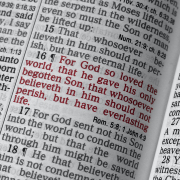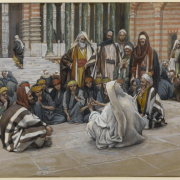What is the Relationship Between God and Jesus?
Things are not always what they seem. Sometimes, discovering this can change everything. The enduring appeal of crime dramas and murder mysteries illustrates how the human mind is eager to uncover what is hidden. Think, for example, of the classic thriller, The Sixth Sense, which includes a plot twist so radical that it begs rewatching from the new angle. The same goes for the original Back to the Future, where nearly every line in the script has some witty significance later in the time-traveling plot. At first, the dialogue seems to be full of throwaway details, but then those details take on a completely new meaning after we see the whole picture.
Reading the New Testament for the first time can give us this kind of experience. At first glance, we can read about the details of Jesus’ life and come away thinking, “Jesus is cool. He’s one of the tribe. He taught some interesting things. No wonder why people like him.” And we could just leave it at that. But that would be like watching only half of The Sixth Sense and saying to ourselves, “Cool movie,” before we ever heard how the iconic line, “I see dead people,” relates to an important character. In short: we haven’t seen the movie at all!
Jesus said things that no sane or cool person should ever say. Jesus also did things that no sane or cool person should ever do. Who goes around saying that he was alive before Abraham, that he is wiser than King Solomon, or that he is one with his Heavenly Father? Who goes around telling people, “Your sins are forgiven,” or features himself as the hero in each of his parables? Who has the audacity to say that he is the only way to truly know God? Who goes around touching contagious lepers, the original social distancers? Who goes around healing those lepers, as well as the lame, the blind, and the diseased? Who thinks he can waltz into God’s Holy Temple and be a one-man wrecking crew of all the moneychangers’ tables inside?
At first glance, you might conclude that the only kinds of people who would do such things would be self-righteous, arrogant, foolish, religious charlatans and zealots. In most cases, you would be right. But let’s not leave the movie before the plot twist. The New Testament’s big reveal about Jesus’ identity makes all of his words and actions make sense.
The New Testament reports of Jesus’ life and teachings make a point of conveying that Jesus was no mere man: he was and is the Son of God. Now, that title has a lot of misunderstandings floating around it. First, let’s talk about what it doesn’t mean. “Son of God” does not mean that there are two gods, father and son. It also doesn’t mean that Jesus was produced through sexual intercourse with God. Instead, it means that Jesus is fully divine—eternally, and unchangeably so.
This likely generates a long list of questions. How can God live among us as a human being? How can a man be God? How is this a Jewish idea? Admittedly, this is hard to understand. But there is actually strong evidence in both the Hebrew Bible and in ancient Jewish teaching that God had promised to dwell in Israel’s midst in physical form.1 After centuries of expectation, the eyewitness authors of the New Testament showed up and said, “Guess what? The one we’ve been waiting for has come. We saw him, talked with him, ate with him, laughed with him—and he is God, the Lord of Israel.”
What would lead these Jewish eyewitnesses to come to this conclusion? Well, to be honest, they were pretty slow to come around. They saw Jesus’ miracles, heard his teachings, and saw his unique way of life, and they came to believe that Jesus was a special man sent by God, even the Messiah. But it still made no sense how Jesus could be God and sent by God at the same time (John 14:8-11). Jesus’ disciples were left scratching their heads. This confusion actually led them to give up all hope in Jesus being the Messiah after he died by crucifixion (Luke 24:21). In their minds, the Messiah isn’t supposed to die. Neither is the God of Israel. They must have thought they had gotten carried away with this Jesus and Messiah business.
But then came the plot twist! It changed everything! Jesus didn’t stay dead—he rose from the grave by the power of God.
That changed everything for Jesus’ depressed and defeated followers. Like Jesus’ body, their faith went from death to life. As good Jewish men and women, they knew that only God raises the dead. Only God is the author of life. If Jesus rose from the dead—of which they were eyewitnesses—then everything Jesus had taught about himself was true, including his hard-to-understand divine identity.
So, what is the relationship between God and Jesus? It is a relationship of intimacy, trust, and ultimately, identity. He is the one Israel was promised: God dwelling in her midst. As God said in the Torah:
I will walk among you and will be your God, and you shall be my people (Leviticus 26:12).
Other articles on this site will attempt to explain this in fuller depth. What we have written here only scratches the surface of these deep things of God. But now you know the plot twist; the whole New Testament makes sense in its light.
Footnotes
- Leviticus 26:12; Malachi 3:1-5; Daniel 7:13-14; Isaiah 59:14-20; 63:1-6. Outside the Bible, multiple Jewish communities and writers spoke of God coming in physical form. We see this in Philo’s Logos, the Targums’ Memra and Shekinah, the Apocrypha’s Sophia, the Pseudepigrapha’s Son of Man, and the rabbis’ Metatron.




 Public Domain
Public Domain


